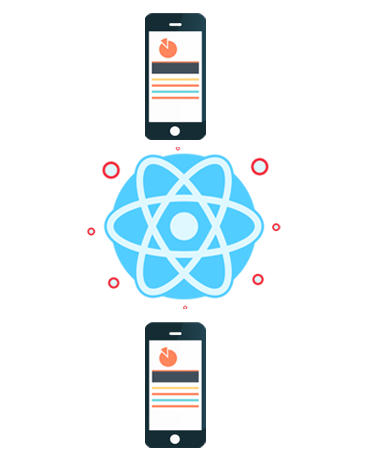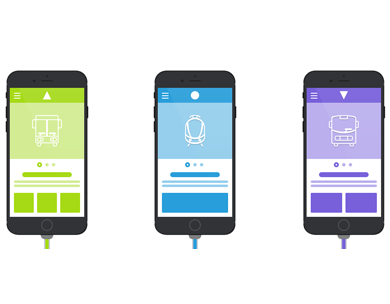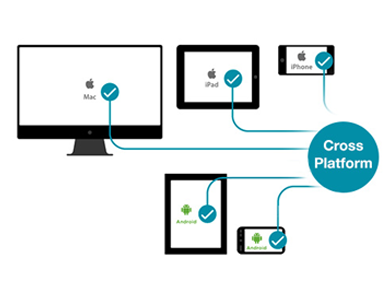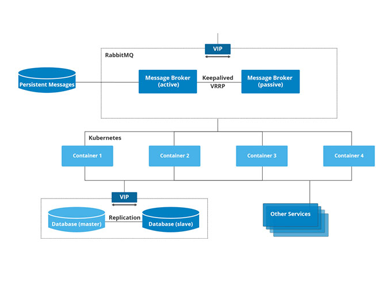We develop application programs for specific platforms or devices and ensure that these will effectively interact with and leverage operating system features and other software installed on them. The technical prowess of our team of experts ensures the flawless performance of the applications developed with meticulous care.
Backed by Facebook and the ease of JavaScript, React Native puts a stop to the age old decision that the mobile app developers encounters - Develop an app that offers a better user experience or one that is faster to develop and run.
Being a renowned React Native Development Company, we give businesses all - a memorable user experience, faster time to market, and wider market expansion, making us a trusted React Native App Development Company in the process.

Our Multi-Platform Apps are based on the Powerful React Native Platform and are backed by a set of aesthetically appealing User Interface, giving the end users an experience that is at par and even surpasses what is offered by Native Apps.

Maintained by the developers at Facebook and Instagram, React Native is the native version of the JavaScript library. It provides a fast track to completion, performs well on targeted platforms, and is easy to debug.
Using React Native, you can build mobile apps that are indistinguishable from the apps developed using Java or Objective-C. It uses the same fundamental user interface building blocks as the regular iOS and Android apps, but you assemble the building blocks using React and JavaScript.
In 2016's F8 conference, both Microsoft and Samsung, the tech giants, committed to bringing React Native to Windows and Tizen. Subsequently, there have been many Universal Windows Platform and Smart TV apps built using React Native.
On the contrary, high performing, quality native apps are time-consuming to develop as compared to cross-platform apps that provide faster deployment but compromise slightly on the performance.

Maintained by the developers at Facebook and Instagram, React Native is the native version of the JavaScript library. It provides a fast track to completion, performs well on targeted platforms, and is easy to debug.
Using React Native, you can build mobile apps that are indistinguishable from the apps developed using Java or Objective-C. It uses the same fundamental user interface building blocks as the regular iOS and Android apps, but you assemble the building blocks using React and JavaScript.
In 2016's F8 conference, both Microsoft and Samsung, the tech giants, committed to bringing React Native to Windows and Tizen. Subsequently, there have been many Universal Windows Platform and Smart TV apps built using React Native.

Mobile apps developed using React Native function as well as any native app, hence the name React Native. When it comes to usability, scroll accelerations, keyboard behavior, and animations can play a defining role in the popularity of the app and, thus, developers cannot ignore it.
The user interface developed with React Native consists of native widgets that perform flawlessly. React Native along with JavaScript runs the most complex of apps smoothly, outperforming even the real native apps, without WebView. Therefore, building apps with React Native is a competitive solution for developing robust apps.

Another significant advantage of using React Native is Live Updates. With the extensive use of JavaScript, developers have the feasibility of pushing the updates directly to the users' phones instead of going through the app store update cycle.
Consequently, this ensures that users can enjoy the updated versions of the app immediately and you do not have to deal with the problems associated with older versions. Moreover, with React Native, the entire procedure is extremely streamlined and simple.

React Native provides a great developing environment, where the developers have a better experience. For starters, it allows the modifications and implementations to take place while the app is running, eliminating the need to restart. Hot reloading refreshes the user interface when changes are made to the file. Consequently, it simplifies the iteration cycle by removing the tedious re-building and deploying step.
Moreover, React Native uses flexbox layout engine for generating app layouts for both the platforms, iOS, and Android. Therefore, you can learn just one layout engine to develop on both platforms and the web.
Design and layout feels a lot more productive if you are quickly able to visualize what you create. For that very purpose, React Native has a great feature called "hot reloading". It allows the changes made in the code to immediately take effect into iOS and Android app variants. It's like a live preview!
React Native interacts with the targeted (native) components for iOS or Android and renders code to native APIs directly and independently. In doing so, it uses a separate thread from UI, which results in increases the performance. The key factor here is React using the native APIs. Other options like using a WebView to render code may have other advantages, but compromise the performance.
As I mentioned above, React Native is an open source project. That means anyone can contribute to the framework. It also means you get to have a more approachable access to great developers and their experience. If you are facing any issues, you have high chances of getting the right kind of help from the community and experts.
Another great feature on the React Native table is the 'Ready-to-apply components'. Instead of writing code from scratch, you get to use ready-made components. They are great for achieving simple forms of functionalities. It not only makes the development process simple but also faster.
Aside from reducing the app development process (which is another way React reduces on cost), React Native enables JavaScript developers to create apps targeting multiple OS, with only a minimal amount of native code necessary. This approach is cheaper and more budget-friendly because you don't need to hire separate developers or teams for different development targets. One developer codes for two platforms – That is less amount of resources and costs spent on building the same apps with smaller development cycles.
Building up on my last point, when one developer codes for both iOS and Android, it evidently reduces the team size as well. Apart from this being a great advantage for not needing to learn two different languages and platforms, it adds in great with a smaller team size too. Having a single team vs having two different teams, an Android team and an iOS team, beats the later with potential better communication. By choosing React Native, you would, at the very max, need a great JavaScript developer who can write code for both (Android and iOS) platforms.
You needn't worry about the stability and reliability of Apps built with React Native. It simplifies data binding with such flow that the child elements cannot affect the parent data. If the developer wants to change any object, he/she would have to modify its state and apply updates accordingly – meaning only allowed components will be upgraded. Great companies like Facebook, Instagram, Airbnb, Skype and a lot more are using React Native for their apps! That, in itself, says quite a lot about the quality, stability and reliability of apps created using React Native.
The ability to create one app running for multiple OS is just great. No matter the simplicity because you might not get all the features or advanced functionality in apt packages for apps created with React Native, but nonetheless, you will have two applications with the time, effort and resources for creating one.
React Native offers a truly native user experience, unlike other hybrid tools that merely provide a native-style wrapper for browser-based apps. Since React native leverages the native components, the final products look and feel very real – as if created with the same native technology. If you are unaware of the technology used to build an app, you will not be able to differentiate between a simple app built with React native or an Android programming language or iOS.
Ready-made components are React Native's one of the most prominent pros. It's a shame there are only a few. Although, it's still a new development framework and that the number of ready-made components is expected to increase drastically, but at the moment the collection is quite small.
Earlier in this article, I mentioned that you might still need to write a minimal amount of native code when developing apps with React Native. This feels like a contradiction, because for someone developing in React Native, avoiding having to code for Android or iOS was probably what they were doing in the first place. This is something you will also need to budget for, especially if your app requires access to device cameras and other onboard hardware. In a rare case, this might out-weigh all React Native pros like a smaller team, time saving, cost reduction.
If you are making a simple app, then sure go ahead – you can use the full benefits of React Native. However, if you require some advanced functionality, then performance might go down the drain in comparison to apps created with platform-specific logic.
I mentioned the small collection of read-made components. That is not a dead end, as there are third-party component libraries that you can choose from. But that would depend on luck, in terms of quality and reliability of that specific 3rd-part library. As they are not created by the official developers, they might contain a lot of bugs and glitches. You spend time correcting those but it would be more productive if you wrote code from scratch, thus, once again defeating the purpose of avoiding platform-specific coding.
If you are new to the React framework and JavaScript, then learning React Native might be a little hard for the average Joe. Especially in comparison to other Cross-platform development options. The JSX is a JavaScript syntax extension that allows mixing HTML with JavaScript. It doesn't come that naturally to the average person and has a steep learning curve, which can be frustrating.
As we know, React Native is a JavaScript -based library. If you are using React Native for apps which require type A security, like mobile banking apps or personal finance apps, you will need to pay extra attention to detail because JavaScript is famous for its fragility. You will need to keep a close watch on malicious code snippets that could, very easily harm your app's core functionality.
Again – expanding on the fact that React Native is JavaScript based, It's not suited for computation intensive apps. The performance and speed is immensely degraded and float computations are handled in an even more inefficient way, in terms of memory usage and management.